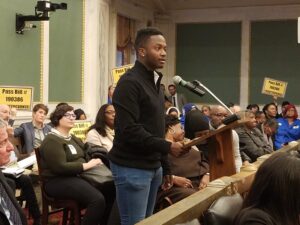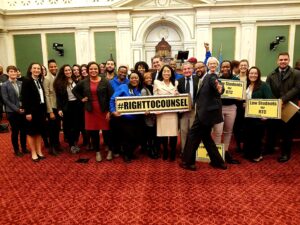Over half of all “legal” evictions in Philadelphia are based on default judgments entered against tenants who have not appeared at their eviction hearings. In these situations, the Court hears from only one side — the landlord — and typically enters a judgment for back rent and eviction in accordance with the landlord’s request. Eviction follows within a few weeks.
By contrast, when both parties are present, the Court tries to help the parties negotiate a settlement. If that can’t be achieved, the judge hears the tenant’s side of the story, as well as the landlord’s, before making a decision.
A new report, “Reducing Default Judgments in Philadelphia’s Landlord-Tenant Court,” addresses some of the reasons that defaults make up such a big part of the Court’s docket. The report is based on the work of students in the Sheller Center’s Access to Justice Clinic. Through observations, interviews, and a review of several hundred court records, the students identified problems with the Court’s operations that, if addressed, could bring the default numbers down.
Some tenants apparently do not appear because they do not get notice of their hearings, or do not understand the notice they received, which is written in complex legal terms (nearly all tenants are unrepresented). Other tenants do not know, since the notice does not tell them, that they can request a change of their hearing date if they have an unmanageable conflict such as a medical procedure. And there are other issues, including the startling fact that the courthouse is barely marked, so that some people miss their hearings simply because they can’t find the building.
Much of the students’ research predated the pandemic and the current moratorium on evictions. But the findings and recommendations are all the more timely now, given the backlog of cases that advocates fear will result in “mass evictions” later this year. The report urges that, as the Court plans for reopening, it take every possible step to ensure that its own procedures do not contribute to the occurrence of “evictions by default.”
The students whose work contributed to the report were Sarah Kim Eisenhard, Alice Elmer, Kevin Kulesza, Xavier O’Connor, Ranjani Sarode, and Julia Sheppard.

 Xavier and colleagues Julia Sheppard and Sarah Kim have spent the semester researching why so many landlord/tenant cases in Philadelphia result in default judgments — which then lead quickly to eviction.
Xavier and colleagues Julia Sheppard and Sarah Kim have spent the semester researching why so many landlord/tenant cases in Philadelphia result in default judgments — which then lead quickly to eviction.
